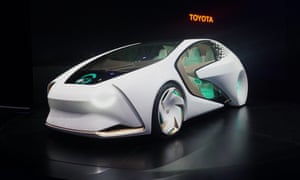Twelve things you need to know about driverless cars

From forecourt to scrapyard, a new car in the UK lasts an average of 13.9 years, which is why if you got one today, it might very well be the last car you buy. Over the next decade, accelerating autonomous driving technology, including advances in artificial intelligence, sensors, cameras, radar and data analytics, are set to transform not only how we drive (or, indeed, are driven), but the notion of car ownership itself. “Autonomous driving has become the next major battlefield for the car industry,” says Luca Mentuccia, automotive global MD at Accenture.
The six levels of automation, defined under international standards by the Society of Automotive Engineers, range from “no automation” to “full automation”, explains Sven Raeymaekers, of tech investment banker GP Bullhound. “If you look at the most recent predictions, the majority of car manufacturers estimate the first highly to fully automated vehicles [AVs] will hit the market between 2020-2025,” he says.
When they do, regulatory approval permitting, their most significant impact is likely to be in the area of urban mobility. “AVs will enable new service configurations where consumers are delivered door to door with virtually no stops in a comfortable vehicle with just one to three other passengers,” says Stan Boland, CEO of FiveAI, which builds AI-driven software for AVs and is one of the companies testing autonomous vehicles on UK roads in 2017, alongside major manufacturers including Volvo and Ford.
Such services will be safer, reduce pollution and congestion, and will also bring about a paradigm shift in personal vehicle ownership rates, which are likely to decline steeply, he says. A recent survey of car manufacturing executives by KPMG similarly revealed that 59% of industry bosses believe that more than half of all car owners today will no longer want to own a car by 2025.
So how exactly will we be getting about by the end of the next decade? Will automation really “solve” crashes, and what other sorts of AVs are we likely to see on our roads? The Observer asked a panel of experts about the likely realities and practicalities of driving in the year 2030.
Will I be a driver or a passenger?
You’ll have a choice, says Dr Nick Reed, academy director at transport consultancy TRL. “If you want to drive an MG and enjoy that, you’ll be able to. Or if you want to prepare for a business meeting during your two-hour journey, you’ll be able to do that too. Automation systems give us choices.”
Nikolaus Lang, of the Boston Consulting Group’s Centre for Digital in Automotive, argues it will depend on the vehicle you’re in. “By 2030, you’ll be a ‘controlling passenger’ in your private self-driving car and you’ll be a ‘complete passenger’ in a robo-taxi.”
Will it still make sense to own a car or will I rent one (on demand)?
Instead of today’s car ownership model, we are far more likely to rely on “mobility as a service” by 2030, says Boland. “Imagine an Uber-like service you can summon at the touch of a button, but without a driver. Renting is not necessarily the right word – consumers will buy a service like using an Uber today, but with a wider range of vehicle configurations to suit different types of travel – family outings, long-distance sleeper travel, or shared commutes.”
However, Lang points out that there’s a clear difference between a young urban population, for whom owning cars makes little sense, and the millions of suburbanites with families, who will probably still opt to own.
Will there still be crashes?
A 2008 survey by the US National Highway Traffic Safety Administration found that human error is the critical reason for 93% of crashes, says Boland. “When you eliminate human error, our roads become dramatically safer: no more drink-driving, phone calls at the wheel, carelessness, inattention or plain bad driving. Clearly there needs to be adequate industry testing to ensure that AVs are safe for all other road users, but we can look forward to far safer roads as human drivers become a thing of the past.”
Read more : https://www.theguardian.com/technology/2017/jan/15/driverless-cars-12-things-you-need-to-know


/https%3A%2F%2Fassets.over-blog.com%2Ft%2Fcedistic%2Fcamera.png)
/http%3A%2F%2Fimages.lctmag.com%2Fpost%2FM-1920px-Cruise-Automation-Bolt-EV-third-generation-in-San-Francisco-1.jpg)
/http%3A%2F%2Fres.cloudinary.com%2Fengineering-com%2Fimage%2Fupload%2Fw_640%2Ch_640%2Cc_limit%2Cq_auto%2Cf_auto%2Fbigstock-Virtual-Screen-Business-Intell-264470257_pkzevz.jpg)
/http%3A%2F%2Fwww.lytx.com%2Fgetmedia%2F702ecc0b-8067-4ba1-8fbe-79c280df57ab%2Fblog-ugc-panel-part2-inner-picture-670x326.jpg)
